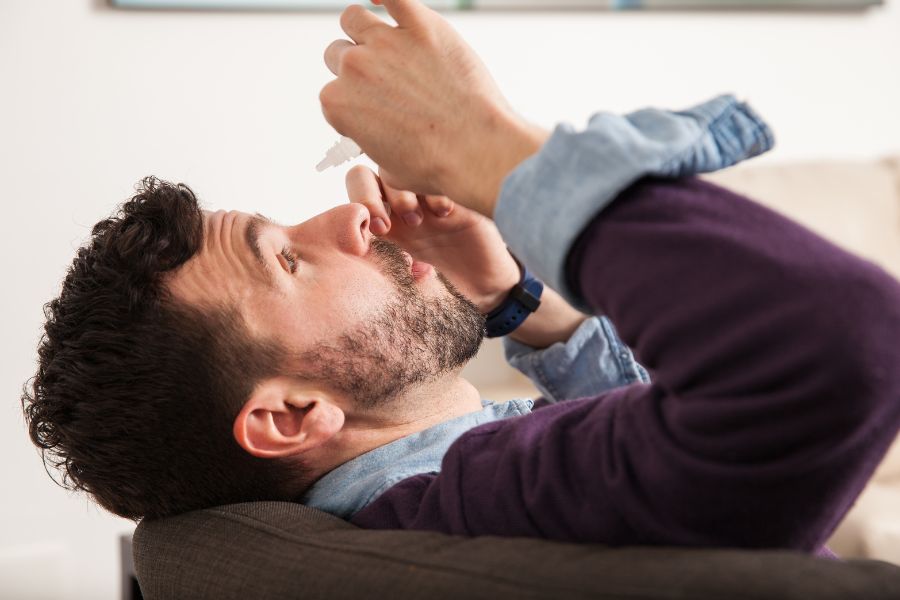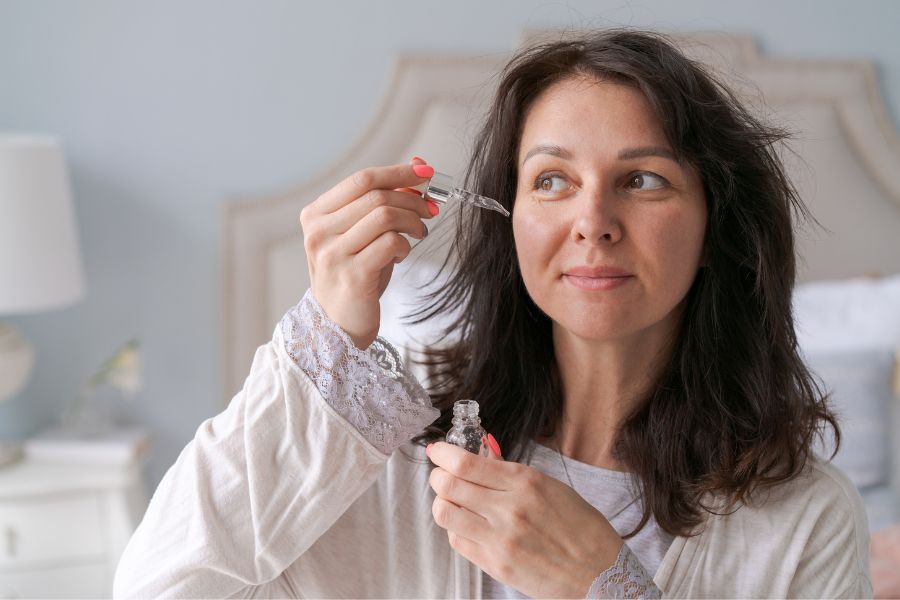Cannabidiol (CBD) comes from the hemp plant. It’s legal and doesn’t make you feel the 5’high’ ingredient found in cannabis. In the United States, more and more people are becoming interested in it. While there are concerns like CBD causing red eye, people who support CBD talk about all the good things it can do for your health. They claim it can help with anxiety and make seizures happen less often in people with epilepsy. People also believe you can use CBD for eyesight.
Some folks also think CBD can help with eye problems like glaucoma. But here’s the catch: CBD and medical marijuana don’t work well for treating eye issues like glaucoma. So, to what extent can CBD aid your eyesight? Read till the end.
How Does CBD Affect The Eyes?
Ongoing research is actively exploring the fascinating effects of CBD on our eyes. While we’re still unraveling all the mysteries, several studies suggest CBD combats eye inflammation.
Eye doctors frequently encounter various medical conditions linked to inflammation, including:
- Cataracts
- Glaucoma
- Macular degeneration
- Allergies
- Meibomian gland disease
CBD holds promise in reducing inflammation associated with these conditions, although it’s not typically the first-line treatment recommended by eye care and medical professionals. In most cases, ophthalmologists and healthcare experts lean towards prescribing anti-inflammatory medications, such as corticosteroids.
Corticosteroids are a group of steroid hormones produced naturally or synthesized artificially by our adrenal cortex. These medications usually come in eye drops and have a proven track record of effectively alleviating eye inflammation.
Furthermore, there’s intriguing evidence suggesting that CBD might offer protection to nerves and alleviate neuropathic pain. This quality could make CBD a compelling option for patients dealing with optic neuritis, glaucoma, and other eye disorders associated with optic nerve damage.
CBD & Glaucoma
Contrary to some beliefs, cannabis has been linked to providing relief from the symptoms of glaucoma. People with glaucoma often experience high pressure within their eyes, known as intraocular pressure (IOP) and ocular therapeutic agent. Excessive fluid pressure harms the optic nerve, leading to vision problems and even blindness.
Cannabis contains a compound called THC, which can temporarily lower IOP in glaucoma patients. This may offer some momentary relief, but it’s not a highly effective treatment. To achieve the same pressure-reducing effects as current top glaucoma treatment with eye drops, a person with glaucoma would need to consume incredibly large amounts of THC daily.
On the other hand, CBD, another compound found in cannabis, may help protect against cell damage and worsen glaucoma. But it doesn’t seem to influence IOP levels. Some studies have suggested that CBD might raise IOP levels, heightening the pressure-related issues in glaucoma. As eye pressure intensifies and starts damaging the optic nerve, gradual vision loss becomes a concern.
What Can CBD Do For The Eyes?
CBD, short for cannabidiol, does more than just impact eye pressure and inflammation. It also has an interesting effect on the balance in our body: the balance between harmful oxidants and helpful antioxidants.
Oxidants are like troublemakers in our cells. They can merge with other molecules and cause serious health issues, like macular degeneration, which affects our eyes.
Think of them as your body’s defenders against those troublemaking oxidants. They help lower the risk of macular degeneration, which is great news for your eye health.
When protecting your eyes from macular degeneration, even stronger superheroes exist. Lutein and zeaxanthin, found in leafy green veggies, are like the Avengers of antioxidants. They’re the real MVPs for keeping your eyes safe from macular degeneration.
It might have another superpower up its sleeve – fighting bacteria. You see, antibiotics, the drugs we use to fight off bacteria, are slowly losing their power because bacteria are getting resistant. But CBD could be a new hero in the battle against bacteria.
Imagine CBD swooping in to save the day when you have eye problems caused by bacteria, like conjunctivitis or blepharitis. It could be a game-changer for the future of treating these infections. So, CBD isn’t just a trendy wellness buzzword; it could be a real eye-saver!
Can CBD Cause Any Eye Problems?
Ongoing research suggests that CBD generally seems safe for the eyes of healthy individuals to treat glaucoma. However, it’s important to note that CBD may increase the pressure inside the eye, and this can potentially worsen symptoms for individuals with glaucoma.
In severe cases of glaucoma, increased eye pressure harms the optic nerve, potentially leading to blindness in the central nervous system. It’s crucial to emphasize that CBD alone has not been definitively linked to causing any glaucoma symptoms, and there isn’t a direct connection between CBD and damage to the optic nerve.
Researchers continue to investigate these interactions to understand CBD’s effects on eye health better.
How To Protect The Eyes?
The CDC and the National Eye Institute (NEI) have some valuable tips to safeguard your vision:
- Regular Eye Check-ups: Make it a habit to see your eye doctor for a thorough eye exam. This helps spot eye issues early.
- Take Breaks from Screens: If you’re glued to screens like computers, phones, or tablets, take short breaks. It eases eye strain.
- Know Your Family’s Eye History: Some eye problems run in families. Learning your family’s history helps you know if you’re at risk.
- Clean Hands and Lenses: If you wear contact lenses, always wash your hands well before handling them. Keep your lenses clean to prevent infections.
- Use Eye Protection: When around machinery, playing sports, or doing activities with potential eye hazards, wear safety gear like goggles, safety glasses, or eye guards. Don’t forget sunglasses to shield against harmful UV rays.
- Manage Diabetes: If you have diabetes, keep it under control to reduce the risk of eye complications.
Take care of your eye diseases and overall health for healthy eyes:
- Eat a balanced diet with a variety of foods.
- Get regular exercise.
- Quit smoking for good eye health.
Remember, these simple steps can go a long way in protecting your vision and keeping your eyes healthy.

What Are the Benefits of CBD?
Exciting research points to CBD as a potential sleep aid, aiding in both falling asleep and staying asleep through the night. But that’s not all – CBD enthusiasts argue that it can be a game-changer for various health issues. Here’s a quick rundown of what the studies, both on animals and humans, suggest CBD might help with:
- Anxiety and depression
- Autoimmune diseases
- Migraines
- Inflammation
- Arthritis and chronic pain
- Insomnia
- Addiction
However, it’s important to note that ongoing research is still filling in the gaps. Many of these claims lack solid evidence for now. It’s also worth mentioning that CBD is typically sold as a dietary supplement, not as a prescribed medication from a doctor.
CBD & Epilepsy
The FDA(Food and Drug Administration) has given the green light to a CBD medicine called Epidiolex. It’s a game-changer for people with epilepsy, especially those dealing with certain types of seizures.
Here’s the deal: Epidiolex is like a superhero for your brain. It calms down the brain cells that go haywire and cause those pesky seizures. Plus, it’s got another superpower – it fights inflammation in your body.
But, even though Epidiolex is becoming more popular and has some awesome effects, most folks with epilepsy still rely on a different kind of hero – anti-epileptic drugs. These drugs work their magic by tweaking the levels of chemicals in your brain.
So, in a nutshell, we’ve got Epidiolex, with its unique powers and trusty anti-epileptic drugs as the go-to options for managing epilepsy. Both are doing their best to make life easier for those dealing with seizures.
Other Side Effects
As per the United States Food and Drug Administration (FDA), CBD may have some other effects you should know about:
- Liver Concerns: CBD might potentially affect your liver.
- Alertness Shifts: It could alter how alert you feel.
- Digestive Issues: Some people might experience gastrointestinal problems.
- Mood Fluctuations: Your mood could be influenced by CBD.
- Drug Interactions: CBD might impact how well other medications work.
- Male Fertility Risk: There’s a possibility it could harm male fertility or age-related macular degeneration.
These are important factors to consider if you’re thinking about using CBD. Always consult a healthcare professional to make the best choices for your health.
Tips For Safely Using CBD
CBD comes in various forms, and there are many ways to use it to support eye and health benefits. You can try CBD oil products, like oils, gummies, or capsules, by taking them orally. Another option is to use CBD-infused eye drops. But it’s crucial to be aware of potential side effects on your eyes.
To use CBD oil products safely, always follow the instructions on the label. Consider factors like your body weight and the product’s concentration regarding dosage. Researchers are still studying to figure out the best doses for these products.
If you decide to use CBD, get it from a trusted source. It’s also a good idea to have a chat with your doctor about using CBD, especially if you’re taking other medications, to make sure there won’t be any unwanted interactions or side effects. Your eye health matters!
Conclusion
Cannabidiol is a hot topic in the world of health and wellness. But what about its effects on your eyes? Can you use CBD for eyesight? Well, we’ve shed some light on the matter above.
Researchers are curious, and here’s why: CBD might just be an eye-saver! Some studies suggest that CBD could team up with receptors in your eyes to help with certain eye issues. That’s right, it might have the power to treat those pesky eye conditions.
Other research throws a curveball, suggesting that CBD could crank up the pressure in your eye and worsen other eye problems. If you’re dealing with other eye conditions or troubles, your trusty doctor should be your go-to guru. Stick to the treatments and prescriptions they recommend.

